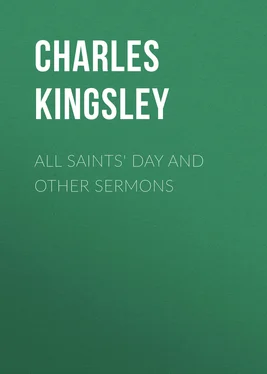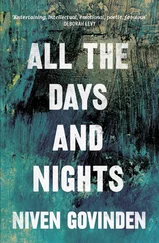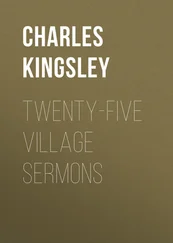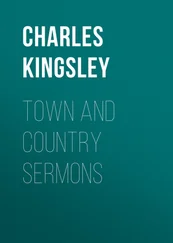Charles Kingsley - All Saints' Day and Other Sermons
Здесь есть возможность читать онлайн «Charles Kingsley - All Saints' Day and Other Sermons» — ознакомительный отрывок электронной книги совершенно бесплатно, а после прочтения отрывка купить полную версию. В некоторых случаях можно слушать аудио, скачать через торрент в формате fb2 и присутствует краткое содержание. Издательство: Иностранный паблик, Жанр: foreign_prose, foreign_religion, Философия, foreign_psychology, foreign_antique, на английском языке. Описание произведения, (предисловие) а так же отзывы посетителей доступны на портале библиотеки ЛибКат.
- Название:All Saints' Day and Other Sermons
- Автор:
- Издательство:Иностранный паблик
- Жанр:
- Год:неизвестен
- ISBN:нет данных
- Рейтинг книги:4 / 5. Голосов: 1
-
Избранное:Добавить в избранное
- Отзывы:
-
Ваша оценка:
- 80
- 1
- 2
- 3
- 4
- 5
All Saints' Day and Other Sermons: краткое содержание, описание и аннотация
Предлагаем к чтению аннотацию, описание, краткое содержание или предисловие (зависит от того, что написал сам автор книги «All Saints' Day and Other Sermons»). Если вы не нашли необходимую информацию о книге — напишите в комментариях, мы постараемся отыскать её.
All Saints' Day and Other Sermons — читать онлайн ознакомительный отрывок
Ниже представлен текст книги, разбитый по страницам. Система сохранения места последней прочитанной страницы, позволяет с удобством читать онлайн бесплатно книгу «All Saints' Day and Other Sermons», без необходимости каждый раз заново искать на чём Вы остановились. Поставьте закладку, и сможете в любой момент перейти на страницу, на которой закончили чтение.
Интервал:
Закладка:
This, then, is the lesson why we are met together this Advent day. We are met to pray that God would so help us by His grace and mercy that we may bring forth the fruit of good works, and that when our Lord Jesus Christ shall come in His glorious majesty to judge the quick and the dead, we, and our descendants after us, may be found an acceptable people in His sight.
We are met to pray, in a National Church, for the whole nation of England, that all orders and degrees therein may, each in his place and station, help forward the hallowing of God’s name, the coming of His kingdom, the doing of His will on earth. We are met to pray for the Queen and all that are in authority, that these Advent collects may be fulfilled in them, and by them, for the good of the whole people; for the ministers and stewards of Christ’s mysteries, that the same collects may be fulfilled by them and in them, till they turn the hearts of the disobedient to the wisdom of the just; for the Commons of this nation, that each man may he delivered, by God’s grace and mercy, from the special sin which besets him in this faithless and worldly generation and hinders him from running the race of duty which is set before him, and get strength from God so to live that in that dread day he may meet his Judge and King, not in tenor and in shame, but in loyalty and in humble hope.
But more—we are here to worship God in Christ, both God and man. To confess that without Him we can do nothing, that unless He enlighten our understandings we are dark, unless He stir up our wills we are powerless for good. To confess that though we have forgotten Him, yet He has not forgotten us. That He is the same gracious and generous Giver and Saviour. That though we deny Him He cannot deny Himself. That He is the same yesterday, to-day, and for ever as when He came to visit this earth in great humility. That the Lord is King, though the earth be moved. He sitteth upon His throne, be the nations never so unquiet. We are here to declare to ourselves and all men, and the whole universe, that we at least believe that the heavens and earth are full of His glory. We are here to declare that, whether or not the kings of the earth are wise enough, or the judges of it learned enough, to acknowledge Christ for their king, we at least will worship the Son lest He be angry, and so we perish from the right way; for if His wrath be kindled, yea but a little, then blessed are they, and they only, who put their trust in Him. We are here to join our songs with angels round the throne, and with those pure and mighty beings who, in some central sanctuary of the universe, cry for ever, “Thou art worthy, O Lord, to receive glory and honour and power: for Thou hast created all things, and for Thy pleasure they are and were created.”
We do so in ancient words, ancient music, ancient ceremonies, for a token that Christ’s rule and glory is an ancient rule and an eternal glory; that it is no new discovery of our own, and depends not on our own passing notions and feelings about it, but is like Christ, the same now as in the days of our forefathers, the same as it was fifteen hundred years ago, the same as it has been since the day that He stooped to be born of the Virgin Mary, the same that it will be till He shall come in His glory to judge the quick and the dead. Therefore we delight in the ancient ceremonial, as like as we can make it, to that of the earlier and purer ages of the Church, when Christianity was still, as it were, fresh from the hand of its Creator, ere yet it had been debased and defiled by the idolatrous innovations of the Church of Rome. For so we confess ourselves bound by links of gratitude to the Apostles, and the successors of the Apostles, and to all which has been best, purest, and truest in the ages since. So we confess that we worship the same God-man of whom Apostles preached, of whom fathers philosophised, and for whom martyrs died. That we believe, like them, that He alone is King of kings and Lord of lords; that there is no progress, civilization, or salvation in this life or the life to come, but through His undeserved mercy and His strengthening grace; that He has reigned from the creation of the world, reigns now, and will reign unto that last dread day, when He shall have put all enemies under His feet, and delivered up the kingdom to God, even the Father, that God may be all in all. Unto which day may He in His mercy bring us all through faith and good works: Amen.
SERMON VI. CAPITAL PUNISHMENT
Eversley. Quinquagesima Sunday , 1872.
Genesis ix. 1, 3, 4, 5, 6. “And God blessed Noah and his sons, and said unto them, Be fruitful, and multiply, and replenish the earth. . . . Every moving thing that liveth shall be meat for you . . . But flesh with the life thereof, which is the blood thereof, shall ye not eat. And surely your blood of your lives will I require: at the hand of every beast will I require it, and at the hand of man; at the hand of every man’s brother will I require the life of man. Whoso sheddeth man’s blood, by man shall his blood be shed: for in the image of God made he man.”
This is God’s blessing on mankind. This is our charter from God, who made and rules this earth. This is the end and duty of our mortal life:—to be fruitful and multiply and replenish the earth, and subdue it. But is that all? Is there no hint in this blessing of God of something more than our mortal life—something beyond our mortal life? Surely there is. Those words—“in the image of God made He man,” must mean, if they mean anything, that man can, if he will but be a true man, share the eternal life of God. But I will not speak of that to-day, but rather of a question about his mortal life in this world, which is this:—What is the reason why man has a right over the lives of animals? why he may use them for his food? and at the same time, what is the reason why he has not the same right over the lives of his fellow-men? why he may not use them for food?
It is this—that “in the image of God made He man.” Man is made in the image and likeness of God, therefore he is a sacred creature; a creature, not merely an animal, and the highest of all animals, only cunninger than all animals, more highly organised, more delicately formed than all animals; but something beyond an animal. He is in the likeness of God, therefore he is consecrated to God. He is the one creature on earth whom God, so far as we know, is trying to make like Himself. Therefore, whosoever kills a man, sins not only against that man, nor against society: he sins against God. And God will require that man’s blood at the hand of him who slays him. But how? At the hand of every beast will He require it, and at the hand of every man.
What that first part of the law means I cannot tell. How God will require from the lion, or the crocodile, or the shark, who eats a human being, the blood of their victims, is more than I can say. But this I can say—that the feeling, not only of horror and pity, but of real rage and indignation, with which men see (what God grant you never may see) a wild beast kill a man, is a witness in man’s conscience that the text is true somehow, though how we know not. I received a letter a few weeks since from an officer, a very remarkable person, in which he described his horror and indignation at seeing a friend of his struck down and eaten by a tiger, and how, when next day he stood over what had been but the day before a human being, he looked up to heaven, and kept repeating the words of the text, “in the image of God made He man,” in rage and shame, and almost accusing God for allowing His image to be eaten by a brute beast. It shook, for the moment, his faith in God’s justice and goodness. That man was young then, and has grown calmer and wiser now, and has regained a deeper and sounder faith in God. But the shock, he said, was dreadful to him. He felt that the matter was not merely painful and pitiable, but that it was a wrong and a crime; and on the faith of this very text, a wrong and a crime I believe it to be, and one which God knows how to avenge and to correct when man cannot. Somehow—for He has ways of which we poor mortals do not dream—at the hand of every beast will He require the blood of man.
Читать дальшеИнтервал:
Закладка:
Похожие книги на «All Saints' Day and Other Sermons»
Представляем Вашему вниманию похожие книги на «All Saints' Day and Other Sermons» списком для выбора. Мы отобрали схожую по названию и смыслу литературу в надежде предоставить читателям больше вариантов отыскать новые, интересные, ещё непрочитанные произведения.
Обсуждение, отзывы о книге «All Saints' Day and Other Sermons» и просто собственные мнения читателей. Оставьте ваши комментарии, напишите, что Вы думаете о произведении, его смысле или главных героях. Укажите что конкретно понравилось, а что нет, и почему Вы так считаете.












